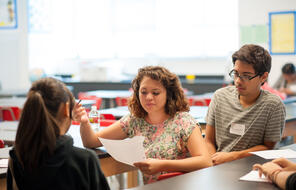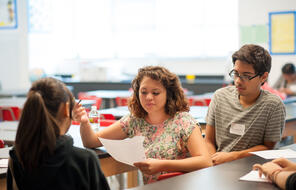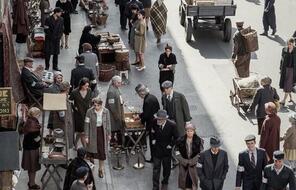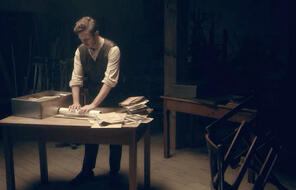Refugee Blues
At a Glance
Language
English — USSubject
- History
- The Holocaust
In 1939, W. H. Auden wrote a poem called “Refugee Blues” that expressed his opinion of the plight of Jewish refugees from Greater Germany. It was reprinted in a number of newspapers.
Say this city has ten million souls,
Some are living in mansions, some are living in holes:
Yet there’s no place for us, my dear, yet there’s no place for us.Once we had a country and we thought it fair,
Look in the atlas and you’ll find it there:
We cannot go there now, my dear, we cannot go there now.In the village churchyard there grows an old yew,
Every spring it blossoms anew;
Old passports can’t do that, my dear, old passports can’t do that.The consul banged the table and said:
“If you’ve got no passport, you’re officially dead”;
But we are still alive, my dear, but we are still alive.Went to a committee; they offered me a chair;
Asked me politely to return next year:
But where shall we go today, my dear, but where shall we go
today?Came to a public meeting; the speaker got up and said:
“If we let them in, they will steal our daily bread”;
He was talking of you and me, my dear, he was talking of you and
me.Thought I heard the thunder rumbling in the sky;
It was Hitler over Europe, saying: “They must die”;
O we were in his mind, my dear, O we were in his mind.Saw a poodle in a jacket fastened with a pin,
Saw a door opened and a cat let in:
But they weren’t German Jews, my dear, but they weren’t German
Jews.Went down the harbour and stood upon the quay,
Saw the fish swimming as if they were free:
Only ten feet away, my dear, only ten feet away.Walked through a wood, saw the birds in the trees;
They had no politicians and sang at their ease:
They weren’t the human race, my dear, they weren’t the human race.Dreamed I saw a building with a thousand floors,
A thousand windows and a thousand doors;
Not one of them was ours, my dear, not one of them was ours.Stood on a great plain in the falling snow;
Ten thousand soldiers marched to and fro:
Looking for you and me, my dear, looking for you and me. 1
Connection Questions
- Who is the speaker of the poem? To whom is the poem addressed?
- What do you think Auden wants his readers to think about? What imagery does he use to communicate his message?
- How does the poem add to your thinking about the refugee crisis in the 1930s? Is the poem’s impact different from that of the other types of sources you’ve encountered in this chapter (such as in the reading, The Voyage of the St. Louis)?
- Is the message of Auden’s poem relevant to any events in the world today? If so, which ones, and why?
- Can you think of a song, poem, or other work of art that has influenced your thinking about history or current events?
- 1W. H. Auden, “Ten Songs,” in Collected Poems, ed. Edward Mendelson (New York: Modern Library, 2007), 263–64. Reproduced by permission from Random House.
How to Cite This Reading
Facing History & Ourselves, "Refugee Blues," last updated August 2, 2016.








